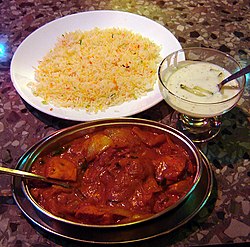Curry
Curry (from Tamil kari) is the English word for any of a general variety of spiced dishes, best known in Indian, Bangladeshi, Sri Lankan, Indonesian, Malaysian, Pakistani, Thai, and other South Asian and Southeast Asian cuisines. Curry has also been adopted into many other cuisines. Curry first came from India. The idea of curry was later brought to the West by British colonialists in India from the 18th century. Dishes that are often called curries in Europe and America are rarely called curries in their native languages.
 Pilau rice, cucumber rhaita and Chicken Tikka Jalfrezi | |
| Place of origin | Indian subcontinent |
|---|---|
| Main ingredients | Spices, herbs, usually fresh or dried hot peppers/chillies |
| |
Curry can also be found in the United Kingdom and Jamaica. It is usually eaten with Basmati rice or naan, a type of flat bread.
A curry dish called Balti is said to have been originated in Birmingham, United Kingdom and has been dubbed Britain’s de facto national dish.[1]
Curry Media
Hannah Glasse's recipe for "currey the India way", first published in her 1747 book The Art of Cookery Made Plain and Easy. It is the first known use of the word in English. (The recipe uses the long s, "ſ").
Chicken tikka masala has been called Britain's national dish.
Bunny chow, South Africa
Japanese style Karē-Raisu (curry rice)
Korean tteokbokki(rice cake curry)
Mutton gulai (Indonesian curry), part of nasi padang
Related pages
References
| Wikimedia Commons has media related to Lua error in Module:Commons_link at line 62: attempt to index field 'wikibase' (a nil value).. |
- ↑ "What makes the Birmingham Balti unique?". BBC News. 19 June 2012. https://www.bbc.co.uk/news/uk-england-birmingham-18494918.







